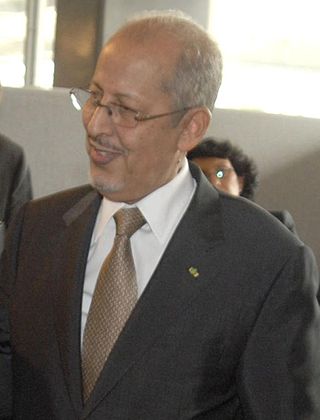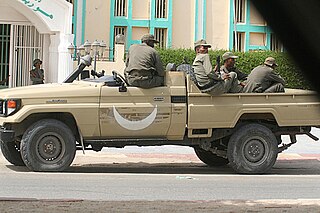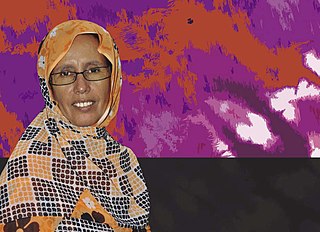Related Research Articles

Mauritania is a presidential democracy, but has suffered from repeated military coups since its Independence in November 1960. For 18 years after independence, Mauritania was a one-party state under Moktar Ould Daddah. This was followed by decades of military rule. The first fully democratic presidential election in Mauritania occurred on 11 March 2007, which marked a transfer from military to civilian rule following the military coup in 2005. The election was won by Sidi Ould Cheikh Abdallahi, who was ousted by another military coup in 2008 and replaced by general Mohamed Ould Abdel Aziz. Mauretania underwent its first peaceful transition of power after the 2019 presidential election, although this was between two presidents of the ruling UPR party and former army generals.

Col. Mohamed Khouna Ould Haidalla was the head of state of Mauritania from 4 January 1980 to 12 December 1984.

The Haratin, also spelled Haratine or Harratin, are an ethnic group found in western Sahel and southwestern Maghreb. The Haratin are mostly found in modern Mauritania, Morocco, Western Sahara, and Algeria. In Tunisia and Libya, they are referred to as Shwashin.

Messaoud Ould Boulkheir is a political figure from Mauritania and a leader in the Haratine community. Messaoud also contributed towards the end of the 1989 events in Mauritania, protecting the right of the victims and the emancipation of the Haratine in Mauritania with his party.

Presidential elections were held in Mauritania on 11 March 2007. As no candidate received a majority of the votes, a second round was held on 25 March between the top two candidates, Sidi Ould Cheikh Abdallahi and Ahmed Ould Daddah. Abdallahi won the second round with about 53% of the vote and took office in April.

Slavery has been called "deeply rooted" in the structure of the northwest African country of Mauritania and estimated to be "closely tied" to the ethnic composition of the country, although it has also been estimated that "Widespread slavery was traditional among ethnic groups of the largely nonpastoralist south, where it had no racial origins or overtones; masters and slaves alike were black", despite the cessation of slavery across other African countries and an official ban on the practice since 1905.

Sidi Mohamed Ould Cheikh Abdallahi was a Mauritanian politician who was President of Mauritania from 2007 to 2008. He served in the government during the 1970s, and after a long period of absence from politics he won the March 2007 presidential election, taking office on 19 April 2007. He was deposed in a military coup d'état on 6 August 2008.
In December 1984, Haidallah was deposed by Colonel Maaouya Ould Sid'Ahmed Taya, who, while retaining tight military control, relaxed the political climate. Ould Taya moderated Mauritania's previous pro-Algerian stance, and re-established ties with Morocco during the late 1980s. He deepened these ties during the late 1990s and early 2000s as part of Mauritania's drive to attract support from Western states and Western-aligned Arab states. Mauritania has not rescinded its recognition of Polisario's Western Saharan exile government and remains on good terms with Algeria. Its position on the Western Sahara conflict has been, since the 1980s, one of strict neutrality.

The 2008 Mauritanian coup d'état was a military coup that took place in Mauritania on August 6, 2008, when President Sidi Ould Cheikh Abdallahi was ousted from power by the Armed Forces of Mauritania, led by a group of high-ranking generals he had dismissed from office earlier that day.

Mohamed Ould Abdel Aziz is a retired Mauritanian military officer and politician who served as the 8th President of Mauritania from 2009 to 2019.

Mauritania, formally the Islamic Republic of Mauritania, is a sovereign country in Northwest Africa. It is bordered by the Atlantic Ocean to the west, Western Sahara to the north and northwest, Algeria to the northeast, Mali to the east and southeast, and Senegal to the southwest. By land area Mauritania is the 11th-largest country in Africa and 28th-largest in the world; 90% of its territory is in the Sahara. Most of its population of some 4.3 million lives in the temperate south of the country, with roughly a third concentrated in the capital and largest city, Nouakchott, on the Atlantic coast.

Presidential elections were held in Mauritania on 18 July 2009. Mohamed Ould Abdel Aziz, who led the 2008 coup d'état, won a narrow first-round majority in the election, according to official results. A second round, if necessary, would have been held on 1 August 2009.

Human rights in Mauritania are generally seen as poor according to international observers, including Freedom House, the United States Department of State, and Amnesty International.

Biram Ould Dah Ould Abeid is a Mauritanian politician and advocate for the abolition of slavery. He was listed as one of "10 People Who Changed the World You Might Not Have Heard Of" by PeaceLinkLive in 2014, and by Time magazine as one of the "100 Most Influential People". He has also been called the "Mauritanian Nelson Mandela" by online news organisation Middle East Eye.
The following lists events that happened during 2011 in Mauritania.
Salimata Lam is a Mauritanian human rights defender. She is an anti-slavery activist, and national coordinator of the human rights non-governmental organisation S.O.S. Esclaves.

L'Malouma Saïd is a Mauritanian anti-slavery activist, deputy to the Mauritanian National Assembly.

Presidential elections were held in Mauritania on 22 June 2019, with a second round planned for 6 July if no candidate had received more than 50% of the vote. The result was a first round victory for Mohamed Ould Ghazouani who won with 52 percent of the vote. However, opposition rejected the results, calling it "another army coup." On 1 July 2019, Mauritania's constitutional council confirmed Ghazouani as president and rejected a challenge by the opposition.

Aminetou Mint El-Moctar is a Mauritanian politician and women's rights activist. She was shortlisted for the Nobel Peace Prize in 2015 and is the first Mauritanian woman to be considered for the award.
Abdallahi Matallah Saleck, also spelled as Abdellahi Matalla Saleck, is a Mauritanian human rights activist and anti-slavery campaigner who rose to prominence as a member of the Initiative for the Resurgence of the Abolitionist Movement. He served 743 days in prison between 2016 and 2018 due to his activism after being arrested at a protest in Nouakchott.
References
- 1 2 3 Sutter, John. "Slave Master Becomes an Abolotionist". article. CNN. Retrieved 2012-05-17.